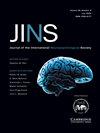Coping patterns associations with cognitive function in older adults
IF 2.6
4区 心理学
Q2 CLINICAL NEUROLOGY
Journal of the International Neuropsychological Society
Pub Date : 2024-09-18
DOI:10.1017/s1355617724000377
引用次数: 0
Abstract
Objective: Cognitive function may contribute to variability in older adults’ ability to cope with chronic stress; however, limited research has evaluated this relationship. This study investigated the relationship between theoretically derived coping domains and cognitive function in 165 middle-to-older adults during the Omicron stage of COVID-19. Method: Participants completed a clinical interview and self-report measures of health. The National Alzheimer’s Coordinating Center Uniform Data Set neuropsychological battery was used to evaluate memory, language, executive function/speed, and working memory. Structural equation modeling evaluated the underlying factor structure of the Brief COPE adapted for COVID-19. Results: The data supported the proposed second-order Approach factor comprised of Problem-Solving and Emotion Regulation (ER) strategies and a first-order Avoidance factor. Higher Avoidance was associated with greater depression symptoms, lower income and worse memory, executive function, working memory, and verbal fluency performance. Higher Problem-Solving was associated with better verbal fluency performance. ER strategies were not significantly associated with cognitive function. The use of Problem-Solving was not associated with less Avoidance. Greater use of Problem-Solving, ER, and Avoidance were all associated with higher levels of stress. Post-hoc analyses found that higher Acceptance was the only coping strategy associated with less stress. Conclusions: These findings demonstrate that older adults with worse cognitive function were more likely to use Avoidance during the pandemic, which could result in prolonged stress and adverse health consequences. Future research is warranted to investigate whether acceptance-based interventions reduce the avoidance and impact of stress on health in vulnerable older adults.应对模式与老年人认知功能的关系
目的:认知功能可能会导致老年人应对慢性压力的能力发生变化;然而,对这种关系进行评估的研究却很有限。本研究调查了 165 名中老年人在 COVID-19 的 Omicron 阶段从理论上得出的应对领域与认知功能之间的关系。研究方法参与者完成了临床访谈和自我健康报告测量。国家阿尔茨海默氏症协调中心统一数据集神经心理测试用于评估记忆、语言、执行功能/速度和工作记忆。结构方程模型评估了为 COVID-19 改编的简要 COPE 的基本因子结构。结果:数据支持所提出的由解决问题和情绪调节(ER)策略组成的二阶接近因子和一阶回避因子。回避程度越高,抑郁症状越严重,收入越低,记忆力、执行功能、工作记忆和语言流畅性越差。问题解决能力越强,语言流畅性越好。应急策略与认知功能的关系不大。使用 "问题解决 "策略与减少回避并无关联。更多地使用 "解决问题"、"应急 "和 "回避 "都与更高的压力水平有关。事后分析发现,较高的接受度是唯一与较小压力相关的应对策略。结论这些研究结果表明,认知功能较差的老年人在大流行期间更有可能使用回避策略,这可能会导致长期的压力和不良的健康后果。今后有必要开展研究,探讨以接纳为基础的干预措施是否能减少易受伤害的老年人对压力的回避和压力对健康的影响。
本文章由计算机程序翻译,如有差异,请以英文原文为准。
求助全文
约1分钟内获得全文
求助全文
来源期刊
CiteScore
5.40
自引率
3.80%
发文量
185
审稿时长
4-8 weeks
期刊介绍:
The Journal of the International Neuropsychological Society is the official journal of the International Neuropsychological Society, an organization of over 4,500 international members from a variety of disciplines. The Journal of the International Neuropsychological Society welcomes original, creative, high quality research papers covering all areas of neuropsychology. The focus of articles may be primarily experimental, applied, or clinical. Contributions will broadly reflect the interest of all areas of neuropsychology, including but not limited to: development of cognitive processes, brain-behavior relationships, adult and pediatric neuropsychology, neurobehavioral syndromes (such as aphasia or apraxia), and the interfaces of neuropsychology with related areas such as behavioral neurology, neuropsychiatry, genetics, and cognitive neuroscience. Papers that utilize behavioral, neuroimaging, and electrophysiological measures are appropriate.
To assure maximum flexibility and to promote diverse mechanisms of scholarly communication, the following formats are available in addition to a Regular Research Article: Brief Communication is a shorter research article; Rapid Communication is intended for "fast breaking" new work that does not yet justify a full length article and is placed on a fast review track; Case Report is a theoretically important and unique case study; Critical Review and Short Review are thoughtful considerations of topics of importance to neuropsychology and include meta-analyses; Dialogue provides a forum for publishing two distinct positions on controversial issues in a point-counterpoint format; Special Issue and Special Section consist of several articles linked thematically; Letter to the Editor responds to recent articles published in the Journal of the International Neuropsychological Society; and Book Review, which is considered but is no longer solicited.

 求助内容:
求助内容: 应助结果提醒方式:
应助结果提醒方式:


